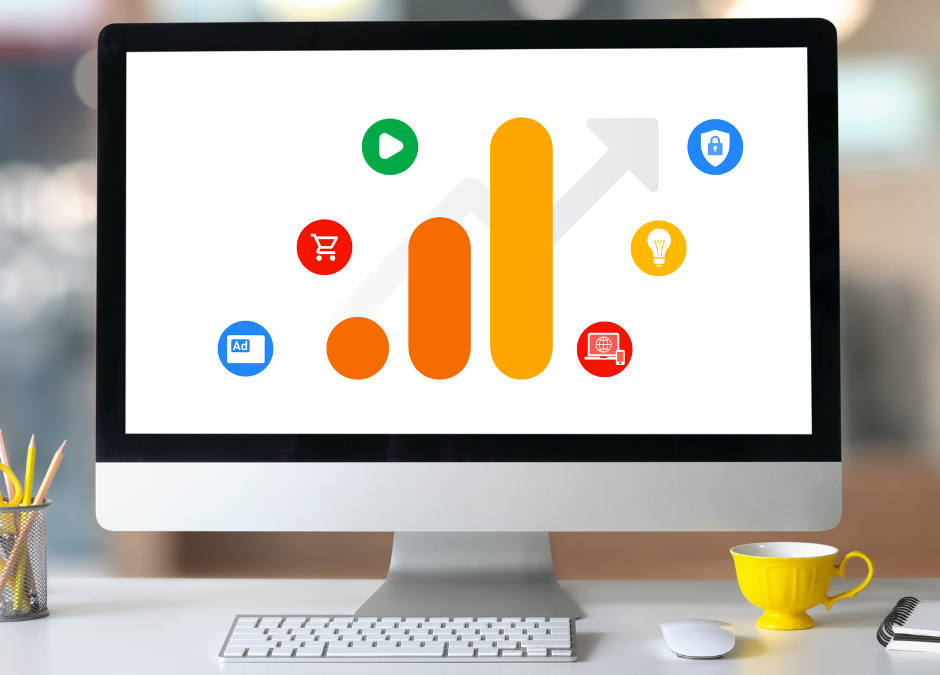A.I.-Driven Data Collection Platform Is Essential for Businesses
Urgent message for any business owner with an online presence: On July 1st, 2023, there was a great migration from Universal Analytics to Google Analytics 4 (GA4). Ensure your business, or the marketing agency you are partnered with, has set up Google Analytics 4 for your company’s site. Universal Analytics ceased processing data after 07/01/2023.
Google offers a simple step-by-step walkthrough for setting up G4 for your business on their page about Google Analytics 4. You can find an even more detailed walkthrough here.
Now, into the details you need to know about Google Analytics 4.
The Importance of Google Analytics 4
Remaining a top spot on search rankings, or earning that top spot, is important. It requires familiarity with many aspects of Google’s constantly updating search policies and technologies.
Near the very top of the List of Important Aspects would have to be Google Analytics. Specifically, Google Analytics 4, which comes with a slew of updates to this important platform.
What Is Google Analytics?
Google Analytics has long been the data processing platform employed by Google.
What it does, exactly, is collect data about your websites and apps, if you have apps for your business.
Here are a few ways that Google Analytics does this.
Tracking Activity on Your Site
One of the ways Google Analytics 4 makes use of your data is by “measuring” the activity on your webpages. This involves tracking webpage visitors’ interactions with your site. It can even count the number of page views your products page receives.
This is specifically valuable for getting a picture of “customer journeys”, such as how they go from one product to the next while clicking through your website.
You can learn whether the blogs you have uploaded to your site covering your various products and services are actually converting to sales or not.
Gaining these customer journey insights can help your company optimize the online experience for customers, and ensure that they become interested in your products and/or services in the most efficient way possible.
Telling You How Visitors Reached Your Site
An important metric that is measured is the avenue by which visitors reached your site. Was it through the sponsored ad you placed on Google Search? Perhaps it was from your social media post promoting your newest line of products?
This incredibly valuable data provides you with direct and immediate evidence of what is working, and what is not, in your online marketing efforts.
Of course, if you are not performing well on social media, the goal here is to find out ways to optimize your social media content, rather than simply focus exclusively on Google Ads. For instance, finding out what posts of yours are driving the most conversions can help inform a newer creative strategy.
Without Google Analytics, online marketing would be a huge roll of the dice. Through GA4, you will be able to make decisions with a greater level of confidence in the results you can expect.
“GA4” is Google Analytics 4, the Latest Update
Google Analytics 4 includes greater privacy controls for website visitors, machine learning that drives identity resolution (i.e., identifying different site visitors without explicitly identifying who they are in real life), and improvements to integrating Google Ads into conversion-tracking features.
Event-based tracking also treats collected data as “events”, which are basically the instances where a customer or potential customer interacted with your website. In GA4, the event-based tracking will broaden to involve many more customer actions, or “events,” which analysts can analyze. This way, you will get an even more detailed picture of what individual customer journeys look like on your site.
Again, we return to a major theme of what Google Analytics 4 offers: An enhanced and more precise view of how your customers engage with your business online. Gaining GA4’s deeper insights into this data will make reaching those customers easier, streamlining your conversions.
How A.I. Is Involved in Google Analytics
Okay, do not get confused, here: artificial intelligence (A.I.) powers Analytics Intelligence (AI).
Specifically, Analytics Intelligence employs machine learning, which is a subfield of A.I. that enables A.I. platforms to autonomously improve their processes.
A.I. collects and makes sense of the massive amount of data that Google’s search engines create and host, as well as the websites searches lead to.
Thanks to A.I., you receive insights about web activity very quickly, and A.I. makes predictions about how to improve your website’s performance with unbeatable accuracy.
Want to see how A.I. can further transform your business beyond GA4? From gaining insights into your customer base to predicting how your marketing content will perform, you can get a range of A.I. solutions when you GO AI with Guardian Owl Digital.
GO AI Articles
Guardian Owl Digital dedicates itself to helping businesses everywhere learn about and implement A.I.
For continuing your AI education and keeping up with the latest in the world of AI, check out our AI blog:
New Year, New AI: Here Are the Biggest Trends in AI Coming in 2023
How AI Could Have Helped Southwest Avoid Its Holiday Disaster
IBM Watson vs. Microsoft’s ChatGPT: The AI Chat Matchup of the Century
AI on the Stand: Explaining the Lawsuit Against the Microsoft Automated Coder
AI and You: What Determines Your AI Recommendations in 2023?
How AI Could Have Foreseen the Crypto Crash—(It Already Analyzes Exchange Markets)
Google’s Response to ChatGPT: What the Tech Giant Is Doing to Improve Its Own AI Efforts


Recent Comments